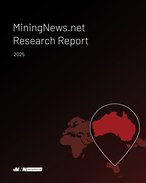True, it hasn’t taken the world - or even Africa - by storm, but just maybe the move earlier this year by Baraka Petroleum and four other companies could provide a lead for the growing number of metals exploration companies combing Africa.
Baraka, along with Adelphi Petroleum, Arc Energy, Advanced Well Technologies and Beach Petroleum, signed a memorandum of understanding to join forces to search out exploration opportunities in Africa.
Baraka’s reasoning was that so many big companies were now prowling the continent, the small players could get crushed in the rush.
But five companies acting together would provide a more credible case for acquiring concessions when the other bidders included global majors or existing producers.
Not too much has been heard of this alliance since it was formed in March, but that doesn’t mean it was a bad idea.
Look at the situation in Africa as far as our junior metals explorers are concerned. They are falling over each other to acquire uranium projects in Namibia, Niger, Zambia; they are looking for rare earths and phosphates in Angola, zinc in Eritrea, anything in Madagascar; and uranium anywhere.
Some have good connections already: CityView Corporation (Angola) and Sphere Investments (Mauritania), for example, have access to money from the Gulf. Others, like Sundance Resources (iron ore in Cameroon), have projects so alluring that institutions are banging on the door waving cheque books.
Back in the 1990s, the intrepid Australian junior heading off to Africa was getting in on the ground floor. Some companies - think Anvil Mining or Equinox Minerals - were able to grab unloved projects that became company makers.
But those days have gone. BHP Billiton has already scored a bauxite project in Guinea and this week said it was investigating spending more than $3 billion on building an aluminium smelter in the Democratic Republic of Congo.
The big attraction is cheap hydro-electricity, but the DRC for heaven’s sake? And $3 billion? That tells you how much things have changed in Africa.
That company is also reported to be looking for diamonds there and considering copper and cobalt concessions in the DRC.
So that’s BHP on the African case. Much has been made of the enormous amounts of money and political arm-twisting the Chinese have used to acquire mineral and oil resources throughout the continent.
But it’s getting hard to move in Africa without banging into someone else in the same game.
Dublin-based Kenmare Resources is now bringing on its Topuito heavy minerals project in Mozambique which will provide about 6 per cent of the world’s titanium feedstock needs; Arcelor Mittal is drilling at three sites in Liberia and plans to have iron ore production going by late 2009 from the first of three mines (and is rehabilitating 300km of railway and a port to help return that country to its role as a large world iron ore player); the Tata group of India is looking to get into mining chrome, manganese, coal and iron ore in South Africa; the majors will soon be queuing up at Nigeria’s door with that country promising to have its mining laws in shape by year-end; Glencore International has put up US$150 million to get the giant Kamoto copper mine in the DRC back into production; and Canada’s Orezone Resources has just spent US$200 million to acquire 60 per cent of a gold project in Burkina Faso.
Starting to get the picture?
Then there’s a French private equity firm, Truffle Capital, which has bought a lead and silver mine in Morocco, China’s Henan International Mining negotiating several bauxite permits in Guinea, the African Development Bank lending US$100 million to two Canadian companies for their copper-cobalt development in the DRC - and on it goes.
In other words, it’s time for Australia to muscle up in Africa. Those companies that can get European or Middle Eastern partners with deep pockets will be fine; the other local juniors might be advised to start looking around to find others in the same boat.
Critical mass will be all in the scramble for Africa over the next few years.
Neither MiningNews.net nor the author implies any recommendations regarding the stocks mentioned. Investors should seek the advice of professional financial advisers.























